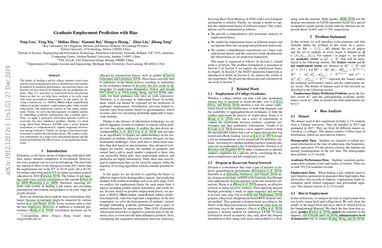Graduate Employment Prediction with Bias
The failure of landing a job for college students could cause serious social consequences such as drunkenness and suicide. In addition to academic performance, unconscious biases can become one key obstacle for hunting jobs for graduating students. Thus, it is necessary to understand these unconscious biases so that we can help these students at an early stage with more personalized intervention. In this paper, we develop a framework, i.e., MAYA (Multi-mAjor emploYment stAtus) to predict students' employment status while considering biases. The framework consists of four major components. Firstly, we solve the heterogeneity of student courses by embedding academic performance into a unified space. Then, we apply a generative adversarial network (GAN) to overcome the class imbalance problem. Thirdly, we adopt Long Short-Term Memory (LSTM) with a novel dropout mechanism to comprehensively capture sequential information among semesters. Finally, we design a bias-based regularization to capture the job market biases. We conduct extensive experiments on a large-scale educational dataset and the results demonstrate the effectiveness of our prediction framework.
PDF Abstract
